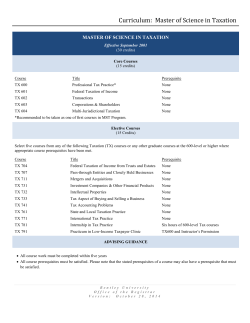
Document
JEAN MONNET MODULE: MANAGING THE EU: TAXATION, ECNOMICS AND GOVERNANCE Newsletter 1st issue, fall 2014 Highlights The new European Commission What’s on the EU’s Agenda Research & Universities Vote in the EU Parliament Catalan Referendum Controversial members EU Enlargement Integration and Disintegrarion in Central and South East Europe JEAN MONNET MODULE: MANAGING THE EU: TAXATION, ECNOMICS AND GOVERNANCE The new European Commission Due to assume office in November, the new EC candidates have faced tough hearings in the European Parliament, amid a stringent need for more awareness of their qualifications, experience and political careers. Meet the nominees here, become more knowledgeable about the approval procedure and seek further information in their CVs. Below, you will find a selection of news pertaining to the sinuous hearings in the European Parliament undergone by the potential future commissioners. European Parliament Rejects Hungarian Nominee The grilling of Tibor Navracsics (photo), JeanClaude Juncker’s proposal for the position of Commissioner for Education, Culture, Youth and Citizenship, yields a negative vote amid accusations of civil rights violations during the Hungarian’s domestic governmental activity. While this does not automatically trigger a new nomination on the part of Budapest, it does mean that Juncker needs to reshuffle his proposals. In fact, Navracsics’s case is indicative of the tough nature of the EP hearings. More information available on Euractiv France’s Pierre Moscovici Undergoes Additional Written Hearing in European Parliament Socialist politician Pierre Moscovici, France’s proposal for the position of Commissioner for Economic and Monetary Affairs, was obliged to answer no fewer than 22 written questions last Friday, in order to receive Parliament’s approval. These enquiries chiefly pertain to budgetary control matters, as well as Moscovici’s relationship with other members of the new Commission, and have received detailed explanations, in keeping with the line expressed during his initial hearing. Intricate matters, such as the application of the Stability and Growth Pact, are part of the debate. Further details available on Euractiv. JEAN MONNET MODULE: MANAGING THE EU: TAXATION, ECNOMICS AND GOVERNANCE What’s on the EU’s Agenda Become familiar with some of the most significant topics on the agenda of the European Union, explored from the standpoint of its most prominent news portal, Euractiv. Multimedia features are available, with the possibility to opt for English, French and German, or, in some cases, one of the 24 official languages of the EU. The Catalan Referendum in Perspective: EU Membership Doubtful Unshaken by the negative result of the recent Scottish referendum, the Catalonian regional government, led by Artur Mas, emphasizes the legitimacy of this consultation and confronts a firm negative response on the part of the Spanish administration. Nevertheless, the consequences of a possible yes vote are far more complex, as EU membership for an independent Catalonia is doubtful. While Catalan politicians insist that compliance with EU norms would enable it to automatically become a member state, voices from within the Commission state otherwise. Weigh the arguments as you consult Euractiv. EU Enlargement Report Catches Montenegro Off-guard The most recent report assessing Montenegro’s stance with regard to future EU membership reveals modest progress and triggers a rough reaction on the part of Enlargement Commissioner Stefan Füle, dismantling the picture of a steadily-progressing democracy. In fact, a shaky interpretation of the rule of law, corruption and political involvement characterize a vulnerable legal system within the small country, whose actions have prompted 1 billion-euros’ worth international court cases in which foreign investors accuse the Montenegrin Government of violating their rights. See a detailed analysis of the situation on Euractiv JEAN MONNET MODULE: MANAGING THE EU: TAXATION, ECNOMICS AND GOVERNANCE EP Eurosceptical Group Dismantled The Europe of Freedom and Direct Democracy Group in the European Parliament, led by Britain’s Nigel Farage, was dissolved after losing a member and falling below the threshold required for having a functional political group. Albeit the number of members of the group remains above the necessary minimum of 25 MEPs, it now has participants from only six member states, whilst seven is the current threshold provided by the Treaties. Latvian MEP Iveta Gricule’s decision to leave the group is widely commented on Euractiv. Market Anxiety over New Eurozone Problems Albeit one cannot speak about a recurrence of the economic downturn at this time, it becomes apparent that a set of new concerns pertaining to the Eurozone are triggering anxiety on the markets. Such problems include the stagnation of growth, the dangerously low inflation rate, political instability in Greece, as well as tense budgetary situations in both France and Italy. A global slowdown has been exhibited recently on the American and Chinese markets, which influences the current situation in the EU, but more domestic factors have added weight to the concerns, such as Germany’s tensions in relation to the European Central Bank over the former’s approach to demand and public investment. A thorough investigation of this important topic is available on Euractiv. JEAN MONNET MODULE: MANAGING THE EU: TAXATION, ECNOMICS AND GOVERNANCE The annual international colloquium organised by the Faculty of European Studies (Babeș-Bolyai University), on the topic of “Disintegration and Integration in East-Central Europe” gathers the most prominent voices in the complex area of European integration from across the continent and envisages the presentation of the latest academic research conducted on this topic, from a broad range of perspectives, encompassing history, political science, international relations and economics. The focus on the so-called “New Europe”, i.e. the latest states to have joined the European Union, is of paramount importance for the academic community at this time, amid the intricate debates on the future of integration, the limits of enlargement and the outcome of the crisis the Community framework has gone through. Along with prestigious Professors from major universities across Europe, the colloquium has special sections dedicated to young researchers and PhD students, often focusing on methodological findings, the state of the art in the field of integration, as well as the latest views on the process of European construction. The second edition of the colloquium was held between 23 and 25 October this year and benefited from the scientific contributions of more than 30 experienced scholars, along with numerous young researchers. Its results will once again see the light of the printing press at a prestigious European publishing house, whose expertise in the area of integration studies will add weight to the impact of this academic event. Contact: email: jm@tbs.ubbcluj.ro web: www.tbs.ubbcluj.ro/jm
© Copyright 2025










